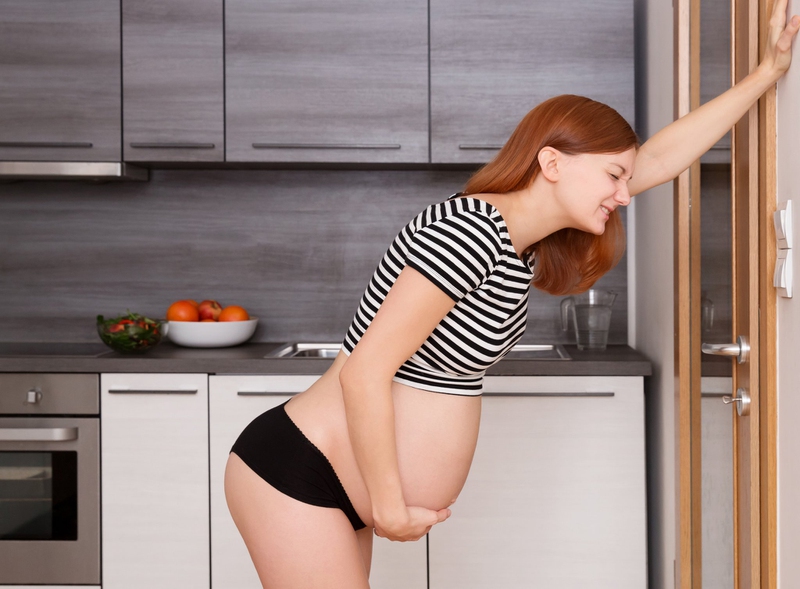It is never easy to deal with abdominal pain during pregnancy and it can be quite startling when you experience menstrual-like cramps in late pregnancy. While period like cramps at 35 weeks do not always indicate a complication, you’d better talk to your doctor to rule out any possibility of underlying medical condition especially your condition is persistent or is accompanied by other symptoms. Let's find out more about it.

Period Like Cramps in Late Pregnancy
Period Like Cramps at Week 35
It is common for women to experience mild cramps when they are 34-35 weeks pregnant. These cramps are also called Braxton Hicks contractions. While these contractions can be a bit uncomfortable, they are never painful. If you experience mild period like cramps at 35 weeks with no additional symptoms, this usually means that your body is getting ready for birth. You are likely to go into labor if you experience cramps along with spotting and backache. Talk to your doctor immediately to confirm whether you are going to have a preterm labor.
Pregnancy Cramping After Week 37
It is not always a bad thing to have cramps after week 37 because they usually indicate that your body is getting ready to go into labor. If you are experiencing early labor signs and the contractions are not too bad yet, you can take certain steps yourself to ease some discomfort.
First and Second Trimester Cramping
First Trimester Cramping (Week 1-Week 12)
You are likely to experience contractions soon after implantation. You may also have some spotting, which is called implantation bleeding which is the result of the fetus implanting into the uterus. Keep in mind that early pregnancy cramping along with some pain and heavy bleeding may indicate a miscarriage. It may also happen due to ectopic pregnancy. Therefore, it is a good idea to talk to your doctor if you are experiencing bleeding and cramping early in pregnancy.
Second Trimester Cramping (Week 13-Week 28)
Many women experience contractions or abdominal cramps in the second trimester, which are usually the result of ligament pain. It could be like a sharp ache or dull ache across your abdominal region. You are likely to experience this pain when you cough or get up from a chair. If you are finding it difficult to manage your ligament pain, you may consider using a maternity belt. A heating pad, pregnancy yoga, and warm bath may also help. Consider using a birthing ball while sitting and take your time when standing from a chair.
Is Cramping During Pregnancy a Cause for Concern?
Signs That Cramping During Pregnancy Is Nothing Serious
You may experience cramps when you have sex while pregnant. That is mainly because semen contains prostaglandins that can stimulate your uterus and cause contractions. You do not have to worry about it usually.
You may experience cramps when changing your position. If the intensity of your cramps changes with your position, this usually indicates that the discomfort is due to stretching of the uterus and is nothing serious.
You may experience cramping when you cannot pass gas. If you find relief when you pass gas or have a bowel movement, this indicates that your cramping has something to do with gastrointestinal problem.
Signs That Cramping During Pregnancy Is Serious
You should talk to your healthcare provider if you are experiencing six or more contractions in an hour. This may indicate preterm labor.
You should never ignore contractions if they are accompanied with lightheadedness, dizziness, or bleeding. This may indicate an ectopic pregnancy that needs immediate medical attention. Bleeding in this case may indicate a miscarriage, so you should see your doctor for further evaluation.
You should seek medical attention if you notice a pink discharge, which in most cases is a sign of preterm labor. It happens when your cervical length may be changing.
You should not ignore persistent cramping if you are carrying multiples, especially if you have a history of ectopic pregnancy or preterm labor.
You should seek medical attention if you have period-like cramps along with back or abdominal pain, vaginal cramping along with discharge, bleeding, dizziness, and gastrointestinal symptoms. If you are also experiencing other issues, such as vomiting, nausea, and fever which may indicate kidney stones, appendicitis, or gallbladder disease, talk to your doctor immediately.
How to Relieve Cramping While Pregnant
It is important to address the underlying cause of cramping to feel better, but you can always take some steps to reduce the discomfort. For instance:
Consider changing your position to see if it offers some relief.
Try some relaxation exercises, such as deep breathing.
You may take a warm bath or shower.
You may utilize a heating pad to relieve pain.
You may go for gentle swimming; gentle walking would also help.
You may do things to distract yourself; watch a movie, read a book, or something that keeps you busy.
You may ask your partner to give you massage.
You may utilize a birthing ball to handle the discomfort.
You may also consider eating some comfort foods, such as chicken broth, smoothies, or toast, but avoid it if your doctor has told you not to.
It is usually a good idea to increase your intake of water at this time.
View All Comments /Add Comment